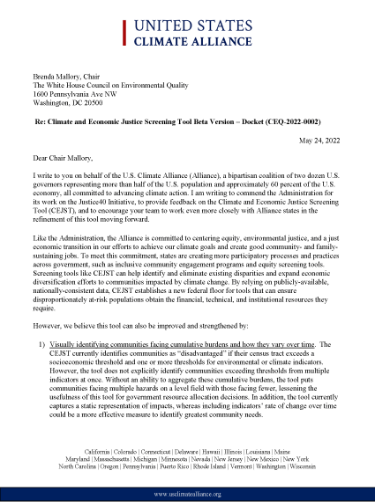Home / U.S. Climate Alliance Recommends Improvements to Administration’s Climate & Environmental Justice Screening Tool

Tags
- Letter
U.S. Climate Alliance Recommends Improvements to Administration’s Climate & Environmental Justice Screening Tool
May 24, 2022
Like the Biden-Harris administration, the U.S. Climate Alliance is committed to centering equity, environmental justice, and a just economic transition in our efforts to achieve our climate goals and create good community- and family-sustaining jobs. To meet this commitment, states are creating more participatory processes and practices across government, such as inclusive community engagement programs and equity screening tools.
Screening tools like the Climate and Economic Justice Screening Tool (CEJST) can help identify and eliminate existing disparities and expand economic diversification efforts to communities impacted by climate change. By relying on publicly-available, nationally-consistent data, CEJST establishes a new federal floor for tools that can ensure disproportionately at-risk populations obtain the financial, technical, and institutional resources they require.
However, we believe this tool can also be improved and strengthened and provided the following feedback.
About the Alliance
Launched on June 1, 2017 by the governors of Washington, New York, and California to help fill the void left by President Trump’s initial decision to withdraw the U.S. from the Paris Agreement, the Alliance has grown to include 24 governors from across the U.S. representing approximately 60% of the U.S. economy and 55% of the U.S. population. Governors in the Alliance have pledged to collectively reduce net greenhouse gas emissions by at least 26-28% by 2025, 50-52% by 2030, and 61-66% by 2035, all below 2005 levels, and collectively achieve overall net-zero greenhouse gas emissions as soon as practicable, and no later than 2050.
The Alliance’s states and territories will continue to advance innovative and impactful climate solutions to grow the economy, create jobs, and protect public health, and have a long record of action and results. In fact, the Alliance reduced its collective net greenhouse gas emissions by 19% between 2005 and 2022, while increasing collective GDP by 30%, and is on track to meet its near-term climate goal by reducing collective GHG emissions 26% below 2005 levels by 2025. The coalition’s states and territories are employing more workers in the clean energy sector, achieving lower levels of dangerous air pollutants, and preparing more effectively for climate impacts and executing more pre-disaster planning than the rest of the country.
###